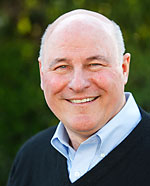President’s Update:
MRF Good News!

Scott Johnson, Myelin Repair Foundation President, CEO and Founder … waiting for a cure since 1976
Dear Supporters and Friends of MRF,
I last wrote to you on June 22 to give you the news that MRF would be closing by the end of the year.
Since then some exciting developments have occurred in all three areas of MRF’s focus:
Discovery Biology: When I informed our scientists and advisory boards about our wind down, there was consistent feedback that the MRF in-person collaboration meetings had provided them with a unique environment for in depth discussion and feedback among leaders in the myelin repair field. They felt that these meetings had greatly impacted the pace of myelin repair progress. They asked if there was any way, despite receiving no further grants from MRF, for MRF to continue to conduct at least one such meeting per year.
We are happy to announce that a generous MRF donor has given us funding to hold the 2015 Annual Research Meeting. The meeting will be in November and held in the Bay Area as usual. We have our full roster of stellar myelin repair scientists who will attend, along with our advisory boards. MRF will act as we have for the last eleven years by setting the agenda, inviting specific guests in addition to our collaborative team, hosting the meeting, and facilitating discussions.
Translational Medicine: Our suite of myelin repair assays, developed at our Translational Medicine Center (TMC), can and should continue to play a key role in developing a myelin repair therapeutic. We feel that the more companies and academics that have our assays, the better the chance of finding a drug to help MS patients. To facilitate that, MRF will publish the assay protocols for general knowledge and use by any who wish to employ them in their research. And we will be posting, for any scientist to view, the results from the compounds we have evaluated to date at the TMC.
In addition, once we made the decision to wind down, our research staff worked fast and furiously to try to find a home(s) for our assays. We targeted and then contacted pharmaceutical companies, contract research organizations, foundations and venture capital firms to identify organizations capable of and interested in employing the MRF assays in drug discovery.
We are thrilled to announce that on September 1, 2015 we signed a research and technology transfer services agreement with Teva Pharmaceuticals USA, Inc. Through the end of November Teva will work closely with our scientific staff to learn the assays with the goal of applying them towards finding a myelin repair therapeutic.
Clinical: The clinical trial of guanabenz (formerly known as MRF-008) is officially underway. This trial, to evaluate in humans the neuro-protective efficacy of guanabenz, directly resulted from MRF efforts. We very much want to stay involved in the trial at the NIH as it proceeds. We also previously committed to covering certain expenses for the NIH. We are pleased to announce that the Conrad N. Hilton Foundation, who has been a generous supporter of MRF for many years, will allow their 2016 pledge payment to MRF to be used to complete the final MRF funding for the clinical trial.
When any news related to the trial can be released, we will do so. In the meantime the only information available about the trial can be found at www.clinicaltrials.gov.
So what does all of this mean for MRF and for you, our supporters and friends?
It means that MRF will stay in existence at least until April of 2016. This allows us to bring the MRF collaborative team together again in November, to transfer our assay knowledge from the TMC, and to honor our commitment to the NIH. We are in a much reduced state – essentially our research staff, finance support and me. Moving into 2016 we do not intend to restart activities we have recently wound down. We will not be making grants to scientists, and we do not intend to continue to operate the TMC beyond our collaboration with Teva. We will evaluate the success of our upcoming research meeting to determine if we can and should continue to conduct such meetings in 2016 and beyond.
I thank you again for your continued support and good wishes during our difficult times. I feel that we now have a solid base with which to continue the work that MRF started and pushed forward during the past eleven years. I am confident that the efforts outlined above will continue to advance the field of myelin repair.
Stay tuned for more news and more developments,
Scott
Focus on Biomarkers
The Myelin Repair Foundation is identifying biomarkers to help accelerate myelin repair treatments.